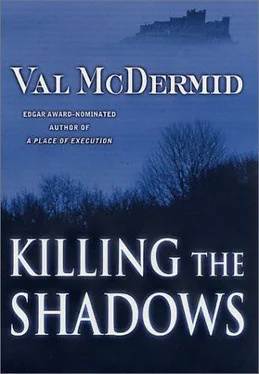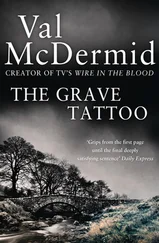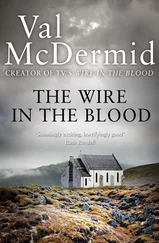The Dorset DCS drew his breath in sharply. “Oh shit,” he said.
“And I’m not sure if DCI Duvall has worked that one out yet,” the DC added, pursing his lips in a superior smile.
Fiona closed her eyes, blotting out the e — mail on the screen in front of her. Confirmation of what she had been dreading was the last thing she wanted in her face. Eventually, she forced herself to reread Kit’s e — mail. This wasn’t the time for self-indulgence. He needed her support, not for her to whimper in the corner like a scared bunny. She composed herself and hit the reply button.
From:Fiona Cameron [fcameron@psych.ulon.ac.uk]
To:Kit Martin [KMWriter@trashnet.com]
Subject:Re: Bad as it gets
My darling Kit,
I’m so, so sorry about Georgia. You must be hurting, my love, and I wish I could do something to take the pain away. I fear I can be of little use on this particular case, even supposing DCi Duvall wanted my help. It’s already clear to anyone with half a brain that these cases are connected, and you know I don’t get into the touchy-feely wet the bed when he was 9 and tortured the neighbour’s cat stuff. So what could I give them? Not much except common sense. So, my love, it is important that you take extreme care of yourself. I’ll be home at the usual time, or earlier if I can manage it.
I love you. F.
Charles Cavendish Redford was adamant that he did not want legal representation. He insisted that he knew more about the criminal law than the average duty solicitor and was perfectly capable of withstanding a police interrogation without someone to hold his hand.
It was a decision that pleased Duvall. She knew that even the most newly qualified duty solicitor would caution Redford to say nothing further. But if he wanted to damn himself from his own mouth, that was fine by her. Lacking a solicitor would simply mean there were fewer interruptions to the flow of what Redford wanted to reveal. And if one thing was clear, it was that Redford was a man who was eager to have his say. She’d had to keep shutting him up when the custody sergeant was processing him; the last thing she wanted was for him to get it all out of his system then clam up once they were in the interview room and on the official record.
As soon as he’d been formally arrested, Duvall sent a team of officers to search his house. Another team were given the task of finding out as much as was humanly possible about the life and times of Charles Redford, self-styled pre-published writer. Then Duvall escaped to her office for ten minutes. She tossed her wrecked coat in the bottom of her locker and replaced it with a lightweight black wool jacket that lived there on permanent stand-by. She shot a mist of her favourite perfume into the air and walked through the miasma, feeling its coolness on her skin. Then she sat down with notepad and pencil, sketching out the main points she needed.
Finally, about an hour after the commotion in the press conference, Duvall found herself facing her self-confessed serial murderer across a Formica-topped table. The room was claustrophobically small, the large mirror on one wall seeming to shrink the space rather than to increase it. The normal scents of stale sweat, smoke and fear were overlaid with a layer of her Versace Red Jeans. No Hannibal Lecter, Redford didn’t so much as twitch his nose.
“At last,” he said impatiently. “Well, go on, get the tape running.”
Duvall’s sergeant reached out and switched on both tape decks. For the record, he dictated date and time and details of those present. The DCS from Dorset, ensconced behind the mirror with his own sound feed, was not on the list.
Duvall sized up Redford. Medium height, medium build. His hair and beard were neatly trimmed, his complexion the pasty-white of someone who spends little time out of doors. His eyes were a dark grey-blue, watchful and deep-set. His tweed jacket looked as if it had been expensive when new, but that had been a long time ago. It fitted him well enough to have been tailored for him, but that meant nothing in these days of charity shops sprouting in every high street like mushrooms. The collar of his tattersall check shirt was a little frayed on the inside edge. His long fingers restlessly intertwined in an endless, meaningless sequence. The impression was one of intensity behind a mask of genteel poverty.
“You’ll have sent a team out to search my flat,” he stated, a smirk quirking one corner of his mouth. “What a waste of time. You’re not going to find anything there except old newspapers. The sort of thing anyone might have who was a bit remiss about going to the recycling bank.”
“We’ll see,” Duvall said.
“You’ll see nothing, Detective Chief Inspector Duvall,” he said, almost chewing the words of her title. “What’s your first name? Something pretty and girly that you hate, I bet. Well, Detective Chief Inspector, I am your worst nightmare.”
Duvall allowed herself an indulgent smile. “I don’t think so, Mr. Redford.”
“Oh, but I am. You see, I committed these murders. I’m freely admitting to that. And I’ll tell you how I did them and what I did. But only up to a point. I’m not going to lead you to any physical evidence, I’m not going to tell you places to look for witnesses. Do you have any idea how many tourist beds there are in Edinburgh? That should keep your opposite number in Lothian and Borders amused for a while. No, all you’re going to have is what I admit to, Detective Chief Inspector.” He grinned, showing small even incisors like a child’s milk teeth. “You’re going to have so much fun with the Crown Prosecution Service. No evidence except a confession. Oh, dear me.”
Duvall looked bored. “Fine. So can we get on with the confession?”
Redford looked momentarily hurt. Then he brightened again. “I see what you’re up to,” he said triumphantly. “You’re trying to wind me up by making me feel dismissed. Well, let me tell you, I’ve read enough and seen enough to understand all your tricks, DCI Duvall. You’re not going to put one over on me. Now, I consider myself to be a storyteller, so let’s start at the beginning.”
“No,” Duvall interrupted incisively. “Let’s try a more radical approach to narrative. Let’s pretend we’re Martin Amis or Margaret Atwood. Let’s start at the end, with Georgia Lester.”
“My.” Redford let out a long drawl of admiration. “A literate cop. I shall have to watch my story structure here. But don’t you want to hear why I’ve taken against thriller writers in such a big way?”
Duvall produced his flyer from her plain black no-nonsense handbag. “I am showing Mr. Redford one of the leaflets he distributed at a police press conference earlier this afternoon,” she said for the benefit of the tape. “I presume your reasons are outlined here? You sent them your novels, hoping they’d help you. But not only did they ignore you, you believe that they stole your plots and plagiarized your writing. An accurate summary?” Her tone was brisk. He was so filled with confidence, the best she could hope for was to unsettle him, and she was going flat out for that. She could feel the adrenaline coursing through her, creative tension holding her tight as a bowstring. It was so seldom that an interrogation proved anything approaching a challenge, and Duvall relished the confrontation.
“Well, yes,” he said, an edge of dissatisfaction in his voice. “But I thought you’d want to know more about that. It’s why I started. You should be interested.”
She shrugged. “Motive is much overrated in detective fiction, Mr. Redford. Remember that GP in Manchester? Harold Shipman? Convicted of killing fifteen elderly patients with morphine overdoses. Nobody really knows why he did it, but it didn’t stop a jury putting him away. I’ll leave the motive to the lawyers. I’m interested in the mechanics of what you did and how you did it. And let’s stick to Georgia Lester, eh? You’ll have plenty of opportunity to talk about your other alleged crimes with officers from other jurisdictions in due course. If, that is, you can convince me that you had anything to do with Georgia Lester’s murder.”
Читать дальше
Конец ознакомительного отрывка
Купить книгу












